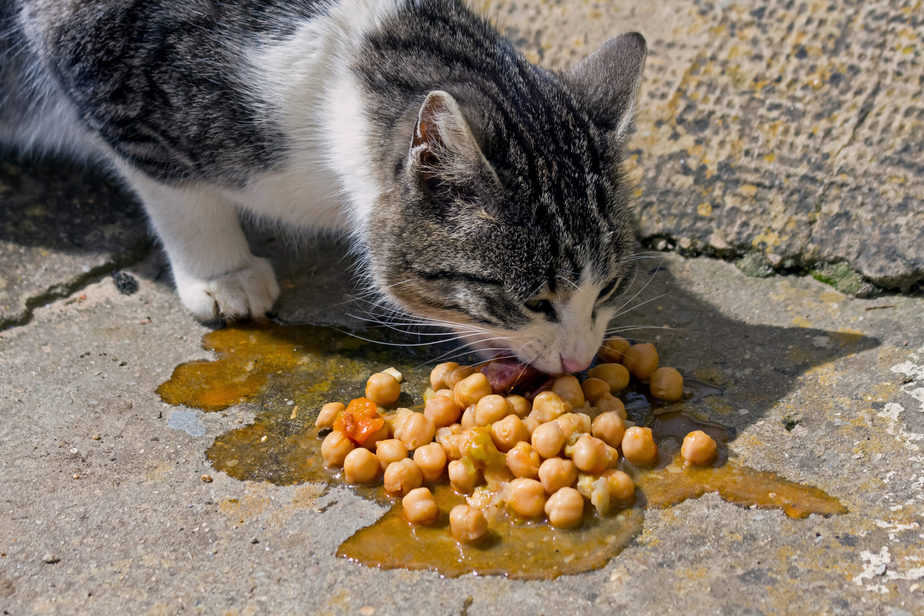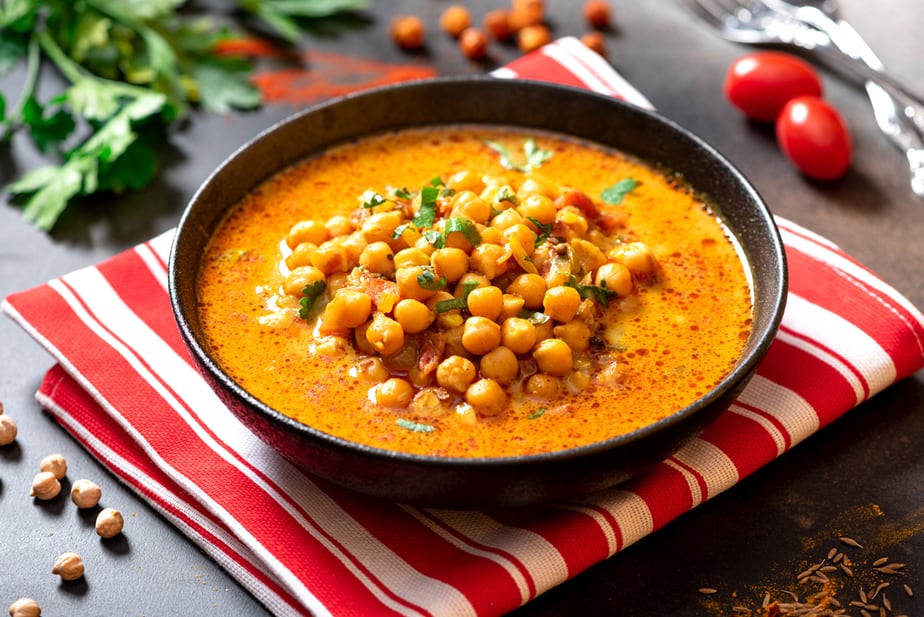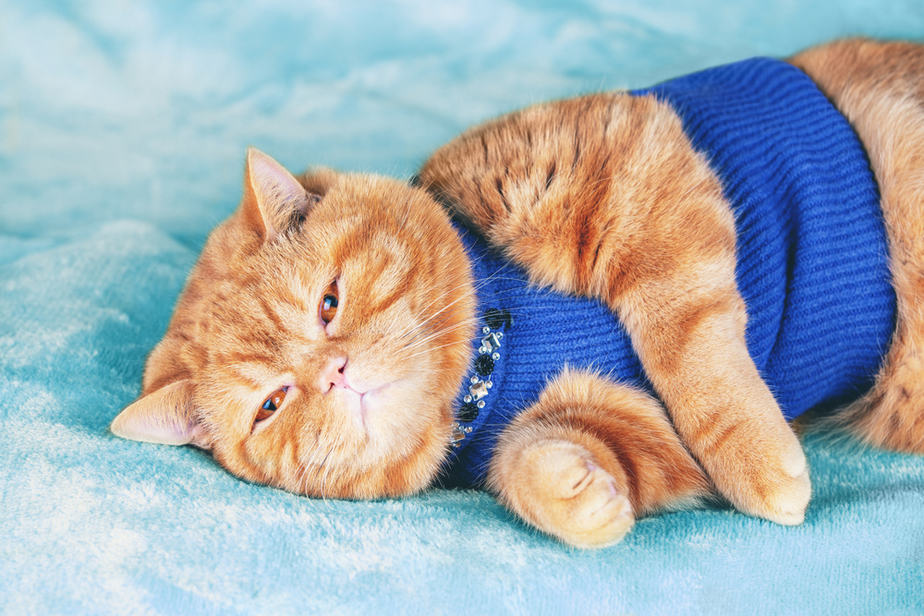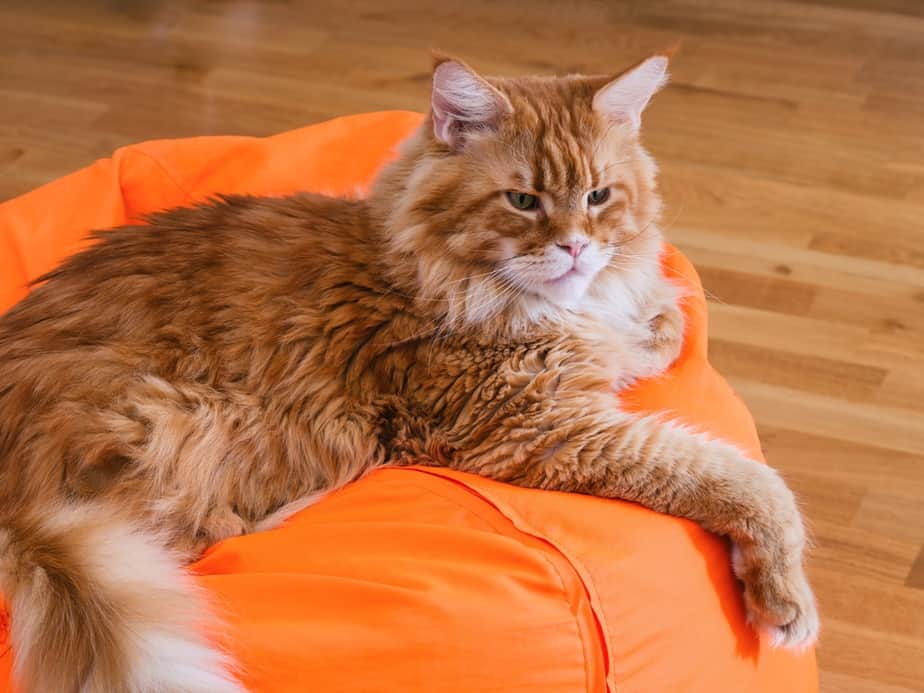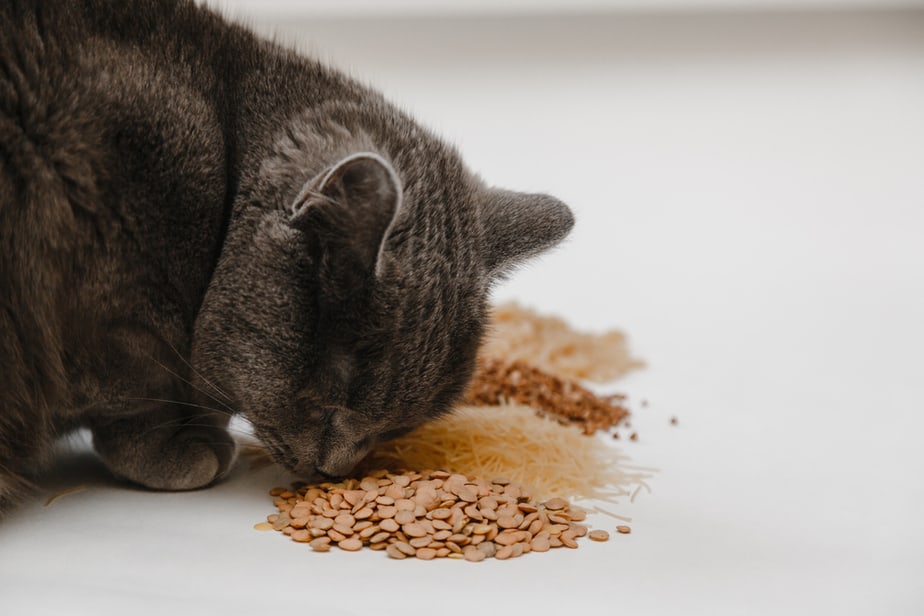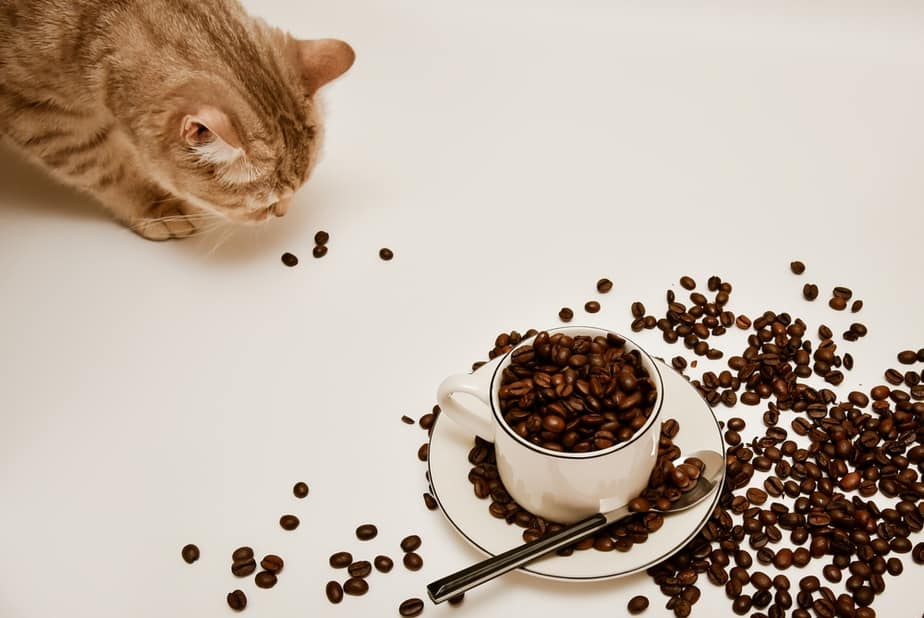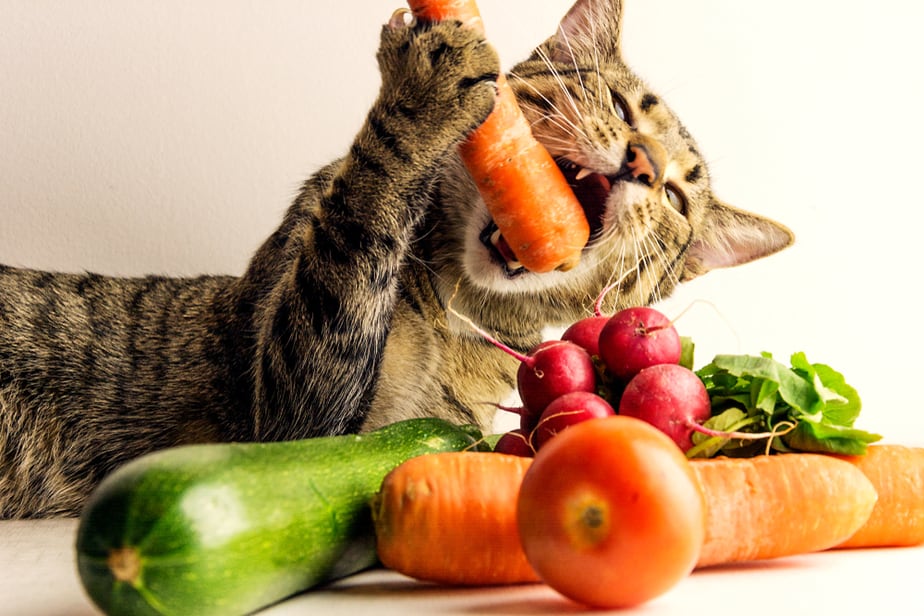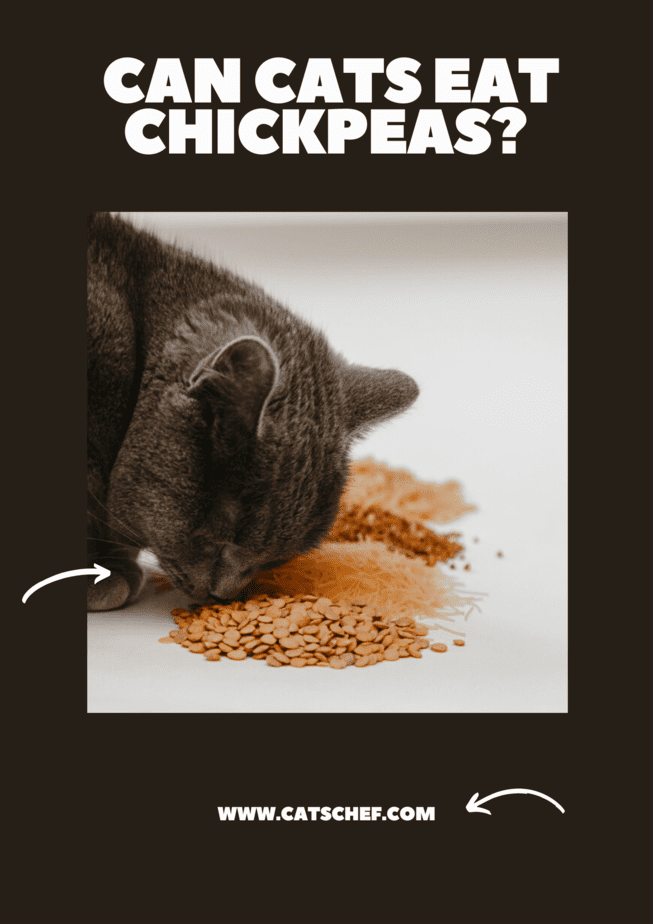📖 Table of Content:
- What are chickpeas?
- Are chickpeas safe for my cat?
- What about canned and dry chickpeas?
- What about a chickpea flour?
- Can my cat benefit from chickpeas?
- Risks of feeding chickpeas
- Do cats (dis)like chickpeas?
- Why does my cat eat garbanzo beans?
- Are peas safe for my cat?
- Can cats eat beans?
- Are lentils safe for my cat?
- What about green beans?
- Coffee beans are still beans, right?
- Can cats eat hummus?
- Alternatives to chickpeas
- Bottom line
The name can be quite deceiving. You’d think it has to do something with chicken. Mmm, cats love it right? Wrong! The answer to the question “Can cats eat chickpeas?” is yes, but the truth is, they shouldn’t.
If you feed your cat chickpeas, she will probably have difficulty digesting them. Other than digestion problems, some other risks might arise as well.
Chickpeas serve as a great addition to human meals, especially salads and soups. Yet, this food is better to be left out of your cat’s diet.
What are chickpeas?
Chickpeas are a type of legume. They come in various shapes, sizes, and colors. Among the beige, black, green, and red varieties, beige is the most popular.
This common type comes in a round shape and another popular name for this food is garbanzo beans. Chickpeas are high in protein, which means a great solution for vegans. They’re useful to someone who’s trying to cut down on meat consumption.
This means it’s not so great for cats. You’d think because of the protein content, chickpeas are an option for your cat. Well, no. Cats need animal protein because they contain certain specific health benefits.
Animal protein is a source of fatty acids, amino acids, and vitamins that can’t be found in plant sources. Therefore, chickpeas are an awesome source of protein for humans. But cats shouldn’t eat chickpeas because they won’t benefit from them.
Are chickpeas safe for my cat?
This type of legume isn’t necessarily bad for felines. This implies that chickpeas aren’t poisonous to them, but they don’t benefit them as meat does.
If your cat nibbles on some, it’s no big deal. But while they technically can eat chickpeas, note that your cat may have a hard time digesting them. Felines find it troublesome to break down plant elements because they’re carnivores.
Besides digestive problems, chickpeas are high in carbohydrates. Felines don’t need carbs as much as they need protein, so do the math.
What about canned and dry chickpeas?
Gargonza beans are prepared in many ways. You can have them cooked, cold in salads, fried, dried, or even ground to flour. But what about cats? Can cats eat any of these forms of chickpeas?
Canned chickpeas are cooked chickpeas and are soft and safe for humans to ingest. On the other hand, they’re off-limits for felines. These canned garbanzo beans have high levels of sodium.
Sodium can be harmful to your pet’s health. Besides salt, canned beans often contain sugar, which shouldn’t be a part of your cat’s diet.
If you ever feed your kitty garbanzo beans, make sure you just toss a few dry ones in her wet food. Other than that, chickpeas either won’t benefit her or will even harm her.
What about a chickpea flour?
Having established what impact chickpeas have on cats, chickpea flour is safe. It’s safe to the extent that it’s cooked into something and is just an ingredient.
You should never give your cat chickpea flour as food, or any flour for that matter. Garbanzo flour or gram flour should only be incorporated in fresh, homemade cat treats.
Can my cat benefit from chickpeas?
In some ways, yes. Although the overall benefit can’t be measured against what cats get from meat-based food. Chickpeas are rich in dietary fiber, which can help in reducing the risks of heart disease.
This fiber, next to legumes, is found in fruits, vegetables, and whole grains. It can have a positive impact on your cat’s health. Dietary fiber is often found in cat food to help them with digestion, and chickpeas are full of it.
The benefits of dietary fiber show in your feline’s digestive functions. This means it can help prevent constipation. Other than that, chickpeas are a source of minerals such as selenium, potassium, and calcium.
These minerals can serve your cat’s immune system and contribute to her heart’s health. Moreover, these minerals are antioxidants that help fight free radicals that can damage cells.
Garbanzo beans are also well-supplied in vitamins B, K, and E. These vitamins play an important role in keeping your cat’s metabolism in check. Supplements like these aid in good nervous system function and muscle contractions.
Risks of feeding chickpeas
Even with all the above-mentioned vitamins and minerals, avoid feeding your cat chickpeas. These beans aren’t toxic to your feline, but she isn’t able to digest plant-based food properly.
Improper digestion will bring your cat discomfort in terms of constipation, diarrhea, or even vomiting. If your cat can’t digest food, she won’t get any possible healthy supplements from it.
So, even though cats can eat chickpeas as they don’t present any harm, they can’t properly digest it. Undigested food will only lead to digestive problems and loss of accessible nutrients.
Do cats (dis)like chickpeas?
If you ever pondered the matter of whether cats like or hate chickpeas, it’s an easy one. Just imagine if your feline was out there in the wild scavenging for food.
Cats are predators and they survive because of meat intake. Your furry monster would probably never eat chickpeas on her own. She’s probably only tempted because she sees you doing that.
However, it’s just out of pure curiosity! You shouldn’t encourage your pet to eat chickpeas though. They mustn’t in any way replace their main source of protein.
We can’t say cats hate chickpeas, but they’re usually picky eaters. So, cats generally don’t like chickpeas, but some of these beans probably won’t freak her out.
Why does my cat eat garbanzo beans?
That’s a good question actually. Due to the fact that garbanzo beans hold no nutritional value to your cat, it’s a mystery. It’s most likely that she just finds them weird or interesting.
Cats are curious creatures and will try to get their paws onto anything and everything. So, just because she shows interest in something doesn’t mean she should have it.
Are peas safe for my cat?
Yes, peas are safe for your cat. Meaning they don’t have anything that’s poisonous to your furbaby. Peas are low in calories, and therefore, can help your chunk lose some weight.
However, if feeding peas to your feline, stay away from canned ones. Canned peas contain high levels of sodium and sugar, which can impair your cat’s health.
You and your fluff may be two peas in a pod. Yet, pods are best to be removed because they are a potential choking hazard. This doesn’t mean you should be removed from the picture though – just looking out for your kitty’s best interest!
Can cats eat beans?
The short answer to this question is yes. Cats can eat beans as they can eat chickpeas. But, even if beans aren’t hazardous to your pet, they aren’t an important part of your cat’s diet.
Beans contain some amount of protein, but it’s not the type your cat needs. She can consume cooked, plain beans from time to time. Still, don’t make this a daily thing because they serve just as an occasional addition to your cat’s meals.
Bean-family foods include lentils, green beans, coffee beans (more on this later), and many others.
Are lentils safe for my cat?
Lentils are safe for your cat, but in moderation. As they only hold small amounts of protein and minerals, your cat won’t get much nourishment.
Apart from not being their regular diet, overconsumption can lead to some gastrointestinal problems. Your feline may experience digestive issues, with consequences of vomiting and diarrhea.
What about green beans?
Green beans are a part of the bean family and the same rule applies to them as for other members. They pose no great threat to your feline.
Your pet may come off as uninterested in this small, round food. That’s totally okay, though, because green beans aren’t an essential part of your cat’s diet.
Coffee beans are still beans, right?
Raising red flags. You should never let your cat eat coffee or cacao beans. The risk lies in two particular compounds: theobromine and caffeine.
These two can greatly impair your feline’s health because of the negative impact on the heart, stomach, and nervous system. These chemical compounds are often found in chocolate.
Just like you wouldn’t give your cat chocolate, you should hold the same opinion on cacao and coffee beans! These harmful components can lead to serious health conditions in felines.
The symptoms of caffeine or theobromine overdose are vomiting, increased body temperature, diarrhea, seizures, and many others. If any of these occur, take an emergency trip to the vet!
Can cats eat hummus?
You may have wondered whether cats can eat hummus due to chickpeas being the main ingredient. It wouldn’t hurt her if she took a tiny nibble, but there are potential risks hidden in this meal.
Besides chickpeas, hummus is commonly made out of tahini, olive oil, lemon juice, garlic, and other spices. Can you spot the intruders?
While tahini and olive oil are safe in small amounts, citrus fruits can become toxic to cats. There are peaks and valleys with these fruits though. Even if harmful, cats aren’t drawn to these because of citrus’ strong scent.
Garlic, on the other hand, is another pair of shoes. This ingredient is highly toxic to cats and should be avoided at all costs. Garlic can come in various forms such as raw, cooked, or powdered, and should keep you on your toes.
Alliums, including garlic and onions, damage your pet’s red blood cells, which eventually leads to organ damage. Organ damage can lead to organ failure – and we know the possible outcome of that.
Alternatives to chickpeas
Garbanzo beans are rich in fiber, and it could lead you to feed them to your cat. However, there are some substitutes your cat could safely munch on.
For instance, lettuce is a great way to add some greens to your cat’s bowl. Lettuce is low in calories and rich in vitamins and minerals. It can only benefit your fluff and replace the chickpeas.
Lettuce will not only serve as a green snack, but will also keep your kitto hydrated and mentally stimulated.
Other foods that can be used as an alternative are apples, carrots, as well as spinach. Cooked carrots and fresh apples can make a great treat for your kitten.
Carrots are high in fiber and apples are an abundant source of vitamins. Spinach can be given raw as a source of entertainment. It can also be useful if cooked because all its healthy nutrients will stay put.
Bottom line
Replace your cat’s chickpeas intake with some green stuff like lettuce, or treats specially formulated for felines. Chickpeas won’t harm your cat immediately, but could lead to digestive issues. Garbanzo beans contain dietary fiber, but there are other ways to fulfill that need.
Make sure you stick to your carnivore’s meat-based food and give chickpeas only occasionally. These small beans will have a greater influence in your salad than your kitty’s kibbles!
Read more: Can Cats Eat Okra? Are These Veggies Safe?
